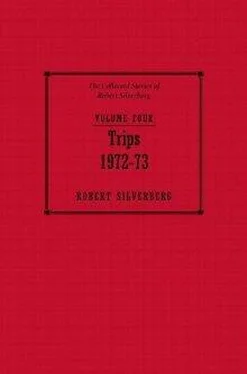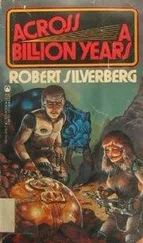Robert Silverberg - Getting Across
Здесь есть возможность читать онлайн «Robert Silverberg - Getting Across» весь текст электронной книги совершенно бесплатно (целиком полную версию без сокращений). В некоторых случаях можно слушать аудио, скачать через торрент в формате fb2 и присутствует краткое содержание. Год выпуска: 2009, ISBN: 2009, Издательство: Subterranean Press, Жанр: Фантастика и фэнтези, на английском языке. Описание произведения, (предисловие) а так же отзывы посетителей доступны на портале библиотеки ЛибКат.
- Название:Getting Across
- Автор:
- Издательство:Subterranean Press
- Жанр:
- Год:2009
- ISBN:978-1-59606-212-2
- Рейтинг книги:5 / 5. Голосов: 1
-
Избранное:Добавить в избранное
- Отзывы:
-
Ваша оценка:
- 100
- 1
- 2
- 3
- 4
- 5
Getting Across: краткое содержание, описание и аннотация
Предлагаем к чтению аннотацию, описание, краткое содержание или предисловие (зависит от того, что написал сам автор книги «Getting Across»). Если вы не нашли необходимую информацию о книге — напишите в комментариях, мы постараемся отыскать её.
Getting Across — читать онлайн бесплатно полную книгу (весь текст) целиком
Ниже представлен текст книги, разбитый по страницам. Система сохранения места последней прочитанной страницы, позволяет с удобством читать онлайн бесплатно книгу «Getting Across», без необходимости каждый раз заново искать на чём Вы остановились. Поставьте закладку, и сможете в любой момент перейти на страницу, на которой закончили чтение.
Интервал:
Закладка:
“You’ve heard?”
“Just stories. Computer breakdown, isn’t it?”
I nod. “Something like that.”
“No police, no garbage removal, no weather control, hardly anything working—that’s what they say.” He seems neither surprised nor disturbed to have an outlander in his shop. His manner is amiable and relaxed. Is he fishing for data about our vulnerability, though? I must be careful not to tell him anything that might be used against us. But evidently they already know everything here. He says, “It’s a little like dropping back into the Stone Age for you people, I guess. It must be a real traumatic thing.”
“We’re coping,” I say, stiffly casual.
“How did it happen, anyway?”
I give him a wary shrug. “I’m not sure about that.” Still revealing nothing. But then something in his tone of a moment before catches me belatedly and neutralizes some of the reflexive automatic suspicion with which I have met his questions. I glance around. No one else is in the shop. I let something conspiratorial creep into my voice and say, “It might not even be so traumatic, actually, once we get used to it. I mean, there once was a time when we didn’t rely so heavily on machines to do our thinking for us, and we survived and even managed pretty well. I was reading a little book last week that seemed to be saying we might profit by trying to return to the old way of life. Book published in Kingston.”
“Walden Three.” Not a question but a statement.
“That’s it.” My eyes query his. “You’ve read it?”
“Seen it.”
“A lot of sense in that book, I think.”
He smiles warmly. “I think so too. You get much Kingston stuff over in Ganfield?”
“Very little, actually.”
“Not much here, either.”
“But there’s some.”
“Some, yes,” he says.
Have I stumbled upon a member of Silena’s underground movement? I say eagerly, “You know, maybe you could help me meet some people who—”
“No.”
“No?”
“No.” His eyes are still friendly but his face is tense. “There’s nothing like that around here,” he says, his voice suddenly flat and remote. “You’d have to go over into Hawk Nest.”
“I’m told that that’s a nasty place.”
“Nevertheless. Hawk Nest is where you want to go. Nate and Holly Borden’s shop, just off Box Street.” Abruptly his manner shifts to one of exaggerated bland clerkishness. “Anything else I can do for you, sir? If you’re interested in supernovels we’ve got a couple of good new double-amplified cassettes, just in. Perhaps I can show you—”
“Thank you, no.” I smile, shake my head, leave the store. A police machine waits outside. Its dome rotates; eye after eye scans me intently; finally its resonant voice says, “Your passport, please.” This routine is familiar by now. I produce the document. Through the bookshop window I see the clerk bleakly watching. The police machine says, “What is your place of residence in Conning Town?”
“I have none. I’m here on a twenty-four-hour visa.”
“Where will you spend the night?”
“In a hotel, I suppose.”
“Please show your room confirmation.”
“I haven’t made arrangements yet,” I tell it.
A long moment of silence: the machine is conferring with its central, no doubt, keying into the master program of Conning Town for instructions. At length it says, “You are advised to obtain a legitimate reservation and display it to a monitor at the earliest opportunity within the next four hours. Failure to do so will result in cancellation of your visa and immediate expulsion from Conning Town.” Some ominous clicks come from the depths of the machine. “You are now under formal surveillance,” it announces.
Brimming with questions, I return hastily to the bookshop. The clerk is displeased to see me. Anyone who attracts monitors to his shop—“monitors” is what they call police machines here, it seems—is unwelcome. “Can you tell me how to reach the nearest decent hotel?” I ask.
“You won’t find one.”
“No decent hotels?”
“No hotels. None where you could get a room, anyway. We have only two or three transient houses, and accommodations are allocated months in advance to regular commuters.”
“Does the monitor know that?”
“Of course.”
“Where are strangers supposed to stay, then?”
The clerk shrugs. “There’s no structural program here for strangers as such. The regular commuters have regular arrangements. Unauthorized intruders don’t belong here at all. You fall somewhere in between, I imagine. There’s no legal way for you to spend the night in Conning Town.”
“But my visa—”
“Even so.”
“I’d better go on into Hawk Nest, I suppose.”
“It’s late. You’ve missed the last tube. You’ve got no choice but to stay, unless you want to try a border crossing on foot in the dark. I wouldn’t recommend that.”
“Stay? But where?”
“Sleep in the street. If you’re lucky the monitors will leave you alone.”
“Some quiet back alley, I suppose.”
“No,” he says. “You sleep in an out-of-the-way place and you’ll surely get sliced up by night-bandits. Go to one of the designated sleeping streets. In the middle of a big crowd you might just go unnoticed, even though you’re under surveillance.” As he speaks he moves about the shop, closing it down for the night. He looks restless and uncomfortable. I take out my map of Conning Town and he shows me where to go. The map is some years out of date, apparently; he corrects it with irritable swipes of his pencil. We leave the shop together. I invite him to come with me to some restaurant as my guest, but he looks at me as if I carry plague. “Goodbye,” he says. “Good luck.”
7.
Alone, apart from the handful of other diners, I take my evening meal at a squalid, dimly lit automated cafeteria at the edge of downtown. Silent machines offer me thin acrid soup, pale spongy bread, and a leaden stew containing lumpy ingredients of undeterminable origin, for which I pay with yellow plastic counters of Conning Town currency. Emerging undelighted, I observe a reddish glow in the western sky: it may be a lovely sunset or, for all I know, may be a sign that Ganfield is burning. I look about for monitors. My four-hour grace period has nearly expired. I must disappear shortly into a throng. It seems too early for sleep, but I am only a few blocks from the place where the bookshop clerk suggested I should pass the night, and I go to it. Just as well: when I reach it—a wide plaza bordered by gray buildings of ornate facade—I find it already filling up with street-sleepers. There must be eight hundred of them, men, women, family groups, settling down in little squares of cobbled territory that are obviously claimed night after night under some system of squatters’ rights. Others constantly arrive, flowing inward from the plaza’s three entrances, finding their places, laying out foam cushions or mounds of clothing as their mattresses. It is a friendly crowd: these people are linked by bonds of neighborliness, a common poverty. They laugh, embrace, play games of chance, exchange whispered confidences, bicker, transact business, and join together in the rites of the local religion, performing a routine that involves six people clasping hands and chanting. Privacy seems obsolete here. They undress freely before one another, and there are instances of open coupling. The gaiety of the scene—a medieval carnival is what it suggests to me, a Breughelesque romp—is marred only by my awareness that this horde of revelers is homeless under the inhospitable skies, vulnerable to rain, sleet, damp fog, snow, and the other unkindnesses of winter and summer in these latitudes. In Ganfield we have just a scattering of street-sleepers, those who have lost their residential licenses and are temporarily forced into the open, but here it seems to be an established institution, as though Conning Town declared a moratorium some years ago on new residential construction without at the same time checking the increase of population.
Читать дальшеИнтервал:
Закладка:
Похожие книги на «Getting Across»
Представляем Вашему вниманию похожие книги на «Getting Across» списком для выбора. Мы отобрали схожую по названию и смыслу литературу в надежде предоставить читателям больше вариантов отыскать новые, интересные, ещё непрочитанные произведения.
Обсуждение, отзывы о книге «Getting Across» и просто собственные мнения читателей. Оставьте ваши комментарии, напишите, что Вы думаете о произведении, его смысле или главных героях. Укажите что конкретно понравилось, а что нет, и почему Вы так считаете.












